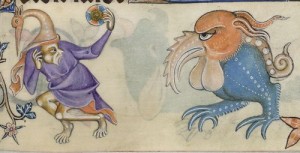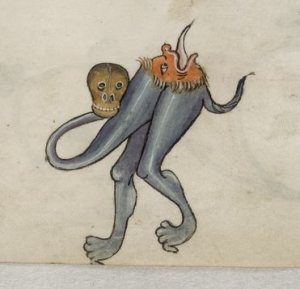On this day in 2003, the Spirit Rover was launched, beginning the Mars Exploration Rover Mission. You can learn more about Spirit Rover here: it will leave you feeling a little teary-eyed and inexplicably proud of a machine, just like when you saw Wall-E.
Writing, Editing, and Publishing:
It’s award season! As I announce these awards, you should just imagine me hopping for 3 ½ minutes like Hugh Jackman did at the Tonys. Because that’s totally what I’m doing. Right now.
The Campbell and Sturgeon awards were announced today. Marcel Theroux won the Campbell for his 2013 novel Strange Bodies, while Sarah Pinsker won the Sturgeon for her short story “In Joy, Knowing the Abyss.”
The finalists for the Lambda Award, which celebrates excellence in LGBT literature, were announced, including a section of awards specifically for SF/Fantasy/Horror, and several works under other categories that we here at Fantasy Literature have reviewed in our Edge of the Universe column, such as Hild and The Daylight Gate.
The British Fantasy Awards have also announced their finalists, including Sofia Samatar’s A Stranger in Olondria, Sarah Pinborough’s Mayhem, and Neil Gaiman’s The Ocean at the End of the Lane.
Finally, the Sidewise Awards for best alternate history have announced their finalists for 2013, including authors like Harry Turtledove, Kristine Kathryn Rusch, and Mark Hodder.
And here’s a list of fantasy and sci-fi books coming out in June, by io9. I personally can’t wait for Greg Van Eekhout’s California Bones; I read his short story based in this world and on this character years ago and fell in love with the concept of osteomancy, or bone magic. As always, you can find more forthcoming titles on our New Release page.
Movies and Television:
Neil deGrasse Tyson lists his top 10 sci-fi films. Am I the only one disturbed by the fact that The Matrix is his favorite movie “in any category”? Don’t get me wrong: The Matrix was my favorite movie, too . . . for about fifteen minutes . . . in college . . . *feels ashamed for criticizing NdGT*
ABC is launching a new reality competition show called The Quest, in which competitors will battle CGI ogres and dragons, I guess? I have no idea how this is supposed to work.
Internet Stuff:
Levar Burton’s Kickstarter to bring back Reading Rainbow went viral a couple of weeks ago, but in case you missed it, “you don’t have to take my word for it.” You can check out the videos yourself. They are not only adorable, but they also have lots of inside jokes for Trekkies. And have you seen some of the perks he offers backers? One of them is to WEAR GEORDI’S VISOR. Yes please.
And while we’re all about getting some people to read, we’re making other people ashamed of what they read. A Slate article arguing that adults shouldn’t read YA this week went viral, prompting this response from io9 and this response from blogger Diana Anderson.
This piece on Tor.com isn’t a direct response to the Slate editorial, but it does point out some of the tools that reading SF/F (a category into which much of YA falls) equips its readers with, especially as we confront issues like the conflict between post-binary gender and our gendered language. This author says, “SFF is about invention and change, yes, but it is rooted in the real: in people,” which is about as succinct a description as any for why I love SF/F so much.
Bloody Disgusting offers a monster size guide, which I hope I will never ever have to use in real life.
Artist Feature:
The Luttrell Psalter is an English medieval illuminated manuscript from the fourteenth century. “Illuminated” in manuscript terms means that the pages have been highlighted and decorated with images and designs, some woven into the letters of the text itself.
This particular manuscript was created by anonymous scribes and artists for the Luttrell family in Lincolnshire; it contains the Psalms, a calendar, and other miscellaneous songs and services.
One of the reasons this manuscript is so significant is what it tells us about medieval life. Its illuminations contain images of servants cooking, men hunting, women sewing, a cat stalking a mouse — all the mundane details of life in Lincolnshire in the 1300’s. However, it is my favorite because of its grotesques and hybrids — strange, ugly, fantastic, and often imaginary images of half-human, half-bestial creatures.
Some of the images I’ve found here are from the Luttrell psalter; some are from other medieval manuscripts. Go to the British Library website to learn more, and to see the Psalter in its entirety on their Turning the Pages project.







I was glad to see the discussion about YA (as an unrepentant reader of it).
Even someone as wonderful as Neil deGrasse Tyson can make a mistake, Kate, and honestly, The Matrix still looks cool after all these years. I’d be inclined to give him that one.
I love the art, Kate!
I still like the Matrix. I think. I haven’t seen it in years, but I THINK I still like it.
The Matrix is good(how can you not love the scene in the lobby?) but it’s not on my top-20 list of favorite movies. I was just surprised by how MUCH he likes it. Then again, the older I get, the more deep appreciation I have for the classic well-made block-busters like Jurassic Park and Indiana Jones, so maybe I should watch the Matrix again.